Hulu’s “The Bisexual” Is Here to Make Every Queer a Little Uncomfortable
During the first two episodes of The Bisexual, I kept thinking, “There’s not a single queer person on the internet who isn’t going to be offended by this in some way” — and by the end of the season, I understood that was the point. Miseducation of Cameron Post director Desiree Akhavan‘s new series, a partnership between the UK’s Channel 4 and Hulu, tells a story you think you’ve heard before, but you haven’t. Akhavan, who’s bisexual in real life, plays Leila, a self-identified lesbian in her mid-30s who breaks up with Sadie (Maxine Peak), her partner of ten years, because Sadie wants to get married and have children and it makes Leila panic. Not long after their break, Leila decides to explore her attraction to men for the first time in her life. What follows is the fallout, for her, for Sadie, for their lesbian friends, for their co-workers, for their parents, for everyone whose lives touch hers in some way.
Akhavan has done something truly brilliant here. She’s created a show for an audience that understands the joke “Bette is a Shane trying to be a Dana” and then centers it on a character who’s meant to make everyone who gets that joke a little uncomfortable. Leila, for example, doesn’t decide to have sex with a man one night and wake up the next morning as a fully formed bisexual role model, confident in her identity as a person who’s attracted to more than one gender, ready to lead the charge to banish erasure and champion inclusion. She doesn’t even want to use the word “bisexual.” And anyway, the fact of her bisexuality isn’t what she’s interested in thinking about or dealing with. She wants to be sexually satisfied, and she misses the comfort and companionship of a relationship that just didn’t turn her on anymore, and she doesn’t know how to exist as her full self in the disparate physical spaces she now inhabits, and she’s grappling with the sudden realization that she’s well into the second act of her life, and yeah she still wants to have sex with women.
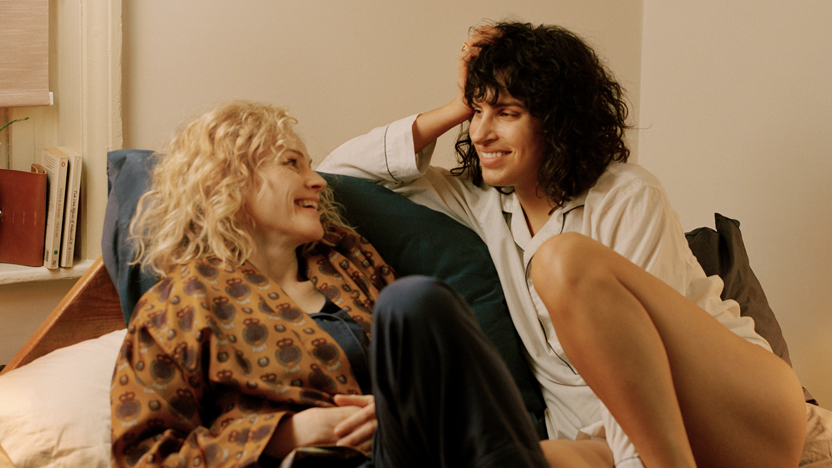
Tina and Bette.
It’s everyone else who doesn’t know how to relate to Leila’s bisexuality, especially her lesbian friends. They shun it, or don’t accept it as real, or don’t understand what it really means in terms of the way she moves through the world, or what it means about who she was before she expressed it, or if it changes their relationship with her. Everyone’s clear on what it means to be a lesbian (but don’t you worry, there’s plenty of clowning to be done on it), and everyone has a completely different idea about what it means to be bisexual. Not gay. Well, not fully gay. She gets it from all sides.
We live in a time when The Discourse is at a fever pitch, where every pop culture portrayal of a queer identity is shaken down to the lowest common denominator of “good” or “bad,”; where every character on every show who is either queer or interacting with a queer must say or do The Right Thing; where any show that makes a misstep in portraying a minority is written off as this or that -phobic (and should be boycotted by queer viewers and writers); where the default angle queer critics are supposed to take is Here’s How This Thing Aggrieves Me. Most pitches I get from college students these days are about Why X Is Problematic, not only because that’s the thinking many young queer writers are surrounded by, but also because that’s what sells right now.
And, look, I have dedicated my life to holding storytellers accountable for their portrayals of queer people. Good pop culture representation is crucial for minorities — for reasons as micro as self-identification and as macro as accessing the civil liberties enshrined in the Constitution. It’s a big deal how we see ourselves and how other people see us on-screen. But there’s a kind of furious dogma that’s choking the nuance out of the conversation we’re having about our stories. In fact, it’s discouraging us from having a conversation entirely, and trading in that give-and-take of ideas for a checklist that authorizes our outrage.
What impresses me most about The Bisexual isn’t that it skewers The Discourse, but that it ignores it completely in favor of having an actual dialogue. Sadie, Leila’s ex-girlfriend, is ten years older her, and she understands Leila’s bisexuality to be an extra level of betrayal. Through gritted teeth and tears she explains growing up as a “dyke in the ’80s,” and the shame and humiliation she put herself through to try to be attracted to men, and the pain she caused herself and her mother when she just couldn’t do it. She thought Leila had that fundamental experience in common with her, and she was wrong, and it’s devastating.
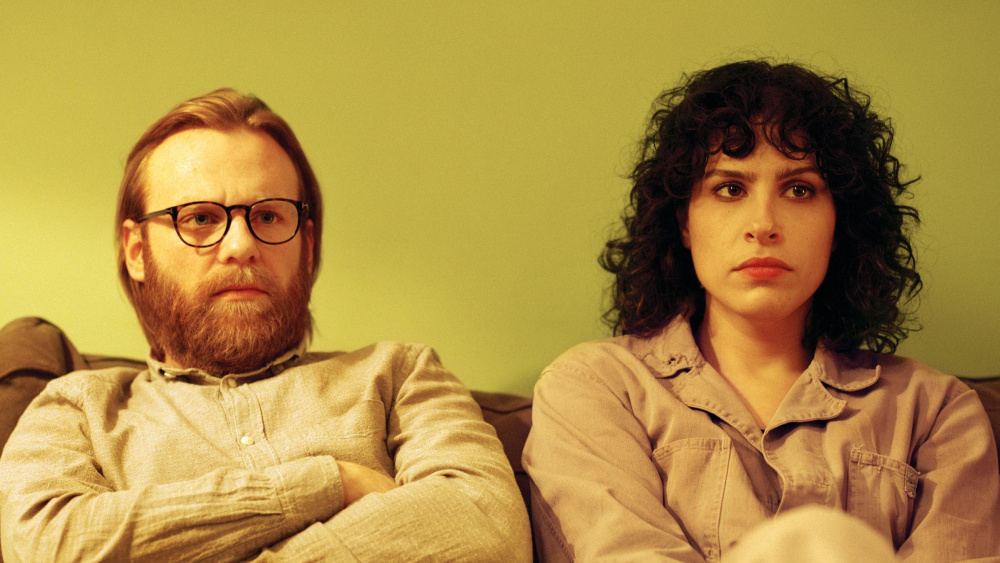
Alice and Shane.
A conversation with an undergrad who’s sleeping with Leila’s straight dude roommate is the opposite thing. She doesn’t understand what the big deal is, identifying as bisexual. She says she’s queer. Leila says everyone under 25 is queer. Then, “I think it’s different. I think when you have to fight for it, being gay can become the biggest part of you. And being gay or straight, it comes with an entirely different lifestyle, like different clothes and different friends and you can’t do both. I don’t mean to be condescending to you. I just don’t know what it’s like to grow up with the internet, but I sense that it’s changing your relationship to gender and sexuality in a really good way, but in a way that I can’t relate to.”
Everything you need to know about the show is really in the title: The Bisexual. The Bisexual. It’s mocking itself and the idea that any one person, any one TV character, can be The anything; as if people grouped by sexuality or gender identity or racial identity are a monolith, and the fullness of their humanity can be expressed and explored through the actions of a single individual. Akhavan seems completely uninterested in answering the FAQ on what it means to be A Bisexual. In fact, she doesn’t really seem intent on answering anything at all. Instead, she asks myriad questions that pierce the armor of our assuredness, questions about how one human being, and the people she loves, might experience this specific revelation at this specific moment in time. Akhavan’s characters absolutely do not always do or say The Right Thing, but her writing is overflowing with compassion.
Language is not precise, and it’s constantly evolving; the meaning of a label to one person might mean a completely different thing to someone else; we are, most of us, doing the best we can in our whisper of time on this earth, in these cursed bodies, plagued by the pain and insecurities of our past experiences, driven by our known and unexplored desires, buoyed by the hope of promises we’ve yet to hear spoken.
“What do you want?” the first man Leila sleeps with asks during their morning-after sex.
Her voice is gentle; not for him, but for herself. She almost laughs. She says, “I don’t know.”
“The Miseducation of Cameron Post” Director Desiree Akhavan Makes Queer Women’s Movies Because She Just Loves Queer Women
When I hopped on the phone with The Miseducation of Cameron Post director Desiree Akhavan after I saw the movie on opening weekend, we both stopped each other in our tracks. I startled her when I told her I’d grown up in an evangelical Christian world almost identical to the one portrayed in her film; and she startled me when she told me nothing had changed about her approach to the movie during the 2016 election. Then we both said, “Of course.” Of course I, a lesbian teen suffocating in the closet with absolutely no pop culture representation to show me the way, would grow up and become a professional queer TV and film critic. And of course she, a second generation Iranian-American immigrant whose parents moved to New York following the Iranian revolution, wouldn’t have needed the rise of Trumpism to convince her a film about the politics of evangelical Christianity is still relevant.
There’s something special about being a queer critic talking to a queer filmmaker — and vice-versa, I suppose. There are lots of of courses. And these conversations are rare. Most queer films, especially the ones that succeed in the mainstream, are written and directed and produced and edited by men. And the same goes for queer film criticism: men, men, men.
“It’s weird when you release a film and read reviews by a bunch of older dudes who are like, ‘I don’t get it.'” Akhavan tells me.
“Right,” I say.
“Right,” she says.
“Because it’s not for them,” we say in unison.
The feeling I get when I’m talking to Desiree Akhavan is the feeling I got when I was watching Cameron Post: that I can relax because she gets it, that I don’t need to explain myself or be on guard, that we’re speaking the same language rooted in shared queer pop culture experiences (or lack thereof). It’s nice because it’s uncommon, but it’s also nice because pop culture is how Cam relates to the world, too.
When we’re discussing some of the more baffling reviews Cameron Post received, I tell her she’s somehow managed to miss out on the go-to men usually lean on when they’re writing about queer women’s films — comparing them to Blue Is the Warmest Color. She laughs, and then groans. “It’s probably because I am on record about how much I hate the sex in that movie!”
I assure her every queer woman hates the sex in that movie. She’s pleased, but not as pleased as when I tell her how authentic the sex in Cameron Post is. It’s the first time I’ve forgotten to feel weird watching women have sex with each other in a movie theater with men, probably because nothing about the way the sex is filmed is for men.
“Good,” Akhavan says. “I want to prove that money can be made off of women’s sexual stories. It’s not just a queer thing. It’s about women receiving pleasure, and giving pleasure. It’s still completely taboo.”
It’s not queer desire that’s still taboo. It’s queer women’s desire. “The Guardian just did this piece about how there are so many films like Call Me By Your Name and Love, Simon that get these big releases,” she says. “Why aren’t we seeing queer women’s stories being backed and celebrated in the same way?”
Because our culture is terrified of women’s sexuality, we both say. Of course, we both say.
She laughs. “But I believe if we stick it out, we can prove money can be made off of women’s desires for each other.”
So far she’s right. Even though it took two months for Cameron Post to find a distributor after it won the Grand Jury Prize at Sundance earlier this year — something Akhavan drily calls “surprising” — the film has exceeded expectations at the box office. It had the highest per screen average of indie films when it opened at two theaters in New York City, will land on 73 screens this weekend, and is ultimately eyeing 250 screens for its full run.
“That’s such a clear example of an audience’s engagement determining the future of a film,” Akhavan says, “If our opening weekend was low, that wouldn’t have happened. But people showed that there was an audience and a demand out there. You can go online and request a film. The actions audiences take have a tangible result. If this movie does well, it won’t be as hard for the next woman to make her movie.”
I’m always glad to talk about queer sex on-screen with another queer woman, but my favorite part of Cameron Post was how it treated the queer kids at God’s Promise. It didn’t make them into the butt of any jokes. Yes, the movie is funny (very, very funny), and at times rightly scathing in its critique of evangelical Christianity, but the queer teens themselves are treated with so much respect. Which was, of course, on purpose.
“These supporting characters can be hilarious in some ways, but we wanted each of them to have a full story. We did a pass of the script from each perspective,” Akhavan tells me. “It’s about giving dignity to all of your characters. We held with Helen singing karaoke for a good long time, for example, because I wanted to show how serious she is about it. When she prays before she sings, it seems funny, but when we hold on her, it’s like, ‘Oh, she prays because she cares.’ It’s not a joke.”
After watching The Miseducation of Cameron Post and talking at length with the woman who played the biggest role in adapting it to the big screen, that’s my main takeaway: that she knows what it’s like to care. Akhavan made this movie because she cared deeply about Emily Danforth’s book. She makes movies, in general, because she cares about the art of filmmaking. She makes queer movies because she cares about queer women.
When I have the occasional good fortune to talk to a queer filmmaker, they usually tell me they don’t want to be pigeonholed as a queer filmmaker. Desiree Akhavan doesn’t tell me that. She tells me she didn’t set out to be a queer filmmaker, but “you follow what you love.”
The Cameron Post of Danforth’s novel would like that answer, a lot. “I just liked girls,” she says when she’s figuring it all out, “because I couldn’t help not to.”
For more information about The Miseducation of Cameron Post, check out the film’s official website, and follow Desireee Akhavan on Twitter.
“The Miseducation of Cameron Post” Is a Hopeful, Hilarious, Heartbreaking Lesbian Coming-of-Age Story
There are lots of ways I could review Desiree Akhavan’s film adaptation of The Miseducation of Cameron Post. I could tell you that its unhurried character exploration, quiet charm, and nuanced social critique are Sundance catnip and no wonder it won the Grand Jury Prize when it premiered there this winter. I could tell you it distills the source material to its essence while maintaining the spirit of Emily M. Danforth‘s beloved novel. I could compare it to its queer cinematic matriarch — softer than But I’m a Cheerleader, the quintessential queer conversion therapy movie; sharper, too; less camp, more satire. Warmer than Disobedience, the other major lesbian movie centered on oppressive patriarchal religions thati hit theaters this year. Harsher — though still hopeful, in its way — than Hearts Beat Loud, the other coming-of-age lesbian indie film that hit theaters this year.
Or I could tell you that when I watched it this weekend I laughed louder and quicker than anyone in the theater, clenched my fists to the point of leaving marks on my palms, and found myself leaning in, in, in to get closer to Chloë Grace Moretz (to comfort Cam with my presence?) even though the camera was pushed in on her as far as it would go. And that, when the film was over, I walked the two blocks back to Union Square, descended into the sticky summer underground air of the New York City subway, squeezed into an open spot near the end of the platform, and sobbed so hard my shoulders shook.
The story goes that Cameron Post’s parents die and she moves in with her evangelical aunt in rural Montana and falls in love with another girl and when they get caught having sex, Cam’s aunt sends her to God’s Promise, a conversion therapy camp where she joins other gay teenagers in addressing the roots of their “sin,” their “SSA” (same-sex attraction). Reverend Rick, a “reformed homosexual,” runs the place with his psychiatrist sister Lydia. He’s all, “Aw shucks, Jesus saved me” and she’s all, “Cameron is already a masculine name; you don’t need to exacerbate your gender confusion by shortening it to Cam.” Lydia is the closest thing Cameron Post has to a bad guy, but the story’s real conflict is whether or not Cam is going to buy into their bullshit. It’s 1993. There’s no tumblr. The internet is hardly invented. Ellen isn’t even out yet.
It would have been easy for Akhavan to paint Christianity as a cartoon villain, and don’t get me wrong, she rightly needles the hell out of it. Over-earnest acoustic praise songs about falling in love with the son of God, Christian rock concerts as a cheap imitation of the music Cam craves, a Jazzercise with Jesus VHS tape. Akhavan invites you to laugh at the absurdity and audacity of it, but then she zooms in on these gay teenagers who just want to use their voices for the glory of God, and watch NFL games with their dads without it giving them “gender confusion,” and follow in the footsteps of their Biblical heroes. “There was given to me a thorn in the flesh,” Mark, the boy with the biggest faith, the one closest to reform cries. “I take pleasure in infirmities, in reproaches, in necessities, in persecutions, in distresses for Christ’s sake: for when I am weak, then am I strong!”
He believes.
Almost all of them believe.
Almost.
Cameron finds her people in self-proclaimed Jane Fonda, a photographer who grows her own weed way out in the woods and is at God’s Promise because her hippie mom married a devout Christian man; and Adam Red Eagle, who identifies as a Lakotan two-spirit and winkte, and landed at camp because his dad decided to join a church so he could run for office. They are played by Sasha Lane, a queer woman of color you already know from American Honey and Hearts Beat Loud and Forrest Goodluck of The Revenant, respectively. Jane and Adam’s spirits are not broken, but they’re deeply subdued. They rebel how they can, sneaking away to smoke and mock Rick and Lydia, but mostly by holding firm to the belief that there’s nothing wrong with them. They’re the only ones at God’s Promise who don’t think they need to be cured.
Moretz’s performance is understated, assured. Surrounded by people who claim the authority of the creator of the universe to condemn and change Cam’s behavior, Moretz remains still. It’s heroic.
Lovingly woven into the God’s Promise narrative are plentiful flashbacks of Cam falling in love and exploring her sexuality with her best friend. Watching her watch Desert Hearts to watch her best friend’s reaction to it is one of the realest things I’ve ever seen on-screen. But that’s not all — it’s the way the lesbian teens at God’ Promise talk about the girls they fell for, the ways they were outed, the circumstances and behaviors the adults in their life blamed for their queerness (sports, short hair, masculine clothes, masculine role models). It’s the way the gay teenage girls look at each other, touch each other, the terrified hopeful ecstasy of it all. There’s no male gaze in this movie, none whatsoever. Desiree Akhavan is a queer woman and her screenplay co-writer Cecilia Frugiuele is a queer woman too. They refuse to apologize for female desire, or to tilt it to make it more palatable to men. It matters.
Cameron ultimately finds her salvation in the truth she suspected from the moment she arrived at God’s Promise, that Rick and Lydia don’t know what the fuck they’re doing, that there’s nothing more dangerous than the tyranny of a weak or compassionless True Believer. It takes a tragedy for her to look Rick in the eyes and confront him with that truth (and, yes, that self-harm scene from the book is in the movie).
I cried when I left The Miseducation of Cameron Post because a movie about conversion therapy in 1993 shouldn’t be as relevant now as it was back then. I cried because it was made by queer women for queer women. I cried because we don’t have to grade lesbian films on a curve anymore. I cried for those kids, in real life and in the movie, who believed. Mostly I cried because I’m a 39-year-old lesbian who’s been professionally critiquing queer media for ten years and I watched this film in Greenwich Village, a mile from the home I share with my girlfriend of eight years — but if I’d been born a few years earlier, or acted on my gayness a few years before I did, or with a different person, or in a place we could have been caught, or if my mother had found out first, in the rural Georgia town where I was born and raised and reborn by the grace of God and baptized in the name of his son Jesus, Cameron Post could have been me.
I laughed, too, though. At the quick-cut to Desert Hearts. At all the Christian pop culture shenanigans. And when one of the God’s Promise kids said to Cam, with such horrified earnestness, on her first day, “I don’t know who you are but I can tell just by looking at you that you’re a dyke!” I laughed even harder than she did. It’s rare to see a lesbian coming of age story this good on film. It’s even rarer to see a movie where your trauma is reflected back at you, but you’re in on all the jokes that helped you make it to today.
Desiree Akhavan on Sex Scenes, Spectatorship, and Shooting ‘The Miseducation of Cameron Post’: The Autostraddle Interview
Featured image courtesy of Variety.
emily m. danforth’s The Miseducation of Cameron Post is a book obsessed with the movies: Personal Best and The Hunger. Elizabeth Taylor’s gasps and Dracula’s thick accent. Even a Christian aerobics videocassette is worth the time of day. To witness Cameron come to life in her very own film — to be able to look at this gay girl from Montana who made a personal brand out of looking — is an endless treat. The adaptation, directed by Desiree Akhavan (Appropriate Behavior) and co-written by Akhavan and producer Cecilia Frugiuele, premiered at Sundance this January.
Here’s how it goes: It’s 1993 and Cameron (Chloë Moretz) has been shipped off to a conversion therapy camp called God’s Promise after she’s caught with a girl from her Bible study group, Coley (Quinn Shephard). Yanked away from everything she holds dear — a beloved copy of The Breeders’ Last Splash included — Cameron approaches “treatment” with mixed feelings and finds chosen family in hippie Jane Fonda (Sasha Lane) and two-spirit Adam Red Eagle (Forrest Goodluck), two God’s Promise residents who know how to score pot and meet the farcical program’s requirements with minimal effort and maximum self-preservation. Cameron, Jane, and Adam are a motley crew, worlds away from the promenade of high school hallways. But to viewers, they couldn’t seem more cool, delivering verbal comebacks and making moves we wish we could were we in their place.
I never want to relive high school or even revisit it undercover like Drew Barrymore in Never Been Kissed, but Cameron Post’s honest, good-humored approach to first love, religious hypocrisy, and the adolescent struggle against adult totalitarianism made me swoon and feel something resembling nostalgia. Despite the serious subject matter, Cameron Post marks the first time I’ve seen a feature film about a band of queer teens that’s felt wholly sincere and unfettered.
For filmmakers, the Sundance equivalent of God’s Promise is probably the Filmmaker Co-Op’s Media Room on Main Street in Park City, Utah. For every twenty-minute conversation a director has with a journalist that validates her creative choices in the Co-Op’s soundproof glass press rooms, there might be two where she’s urged to stop what she’s been doing and repent for their cinematic sins, whatever they may be. The afternoon after Cameron Post’s big reveal and the film’s premiere party — where the cast, crew, and their admirers danced to 4 Non-Blondes into the wee hours — the director, navigating a seven hour-time difference via her London home base, was totally lucid and down to talk about making Cameron.
It all started in 2012, when Akhavan scored a copy of Cameron Post before it went to press. “When my girlfriend at the time and I first read the book, we loved it. We were obsessed with it and gave it to anybody we met,” she said. “Whether it was a birthday or a holiday: ‘Read this, please, you’re gonna love it.’ Because it was the first honest depiction of growing up gay that felt really human, funny, and not like taking your medicine.”
The admiration was mutual: danforth was a big fan of The Slope, the wry web series that Akhavan co-created with then-girlfriend Ingrid Jungermann (Women Who Kill) in 2010. “Desi first reached out to me about Cameron way back before it was even published,” emily said. “She emailed a really lovely note …so we just exchanged our little fan letters back and forth and then we met up a few times in the years after.”
After Akhavan’s first feature, Appropriate Behavior, premiered to critical acclaim at Sundance, she gave danforth a holler. “Summer of 2014, I think, when she was making the rounds and trying to figure out what project to do next, she reached out again. We had a long phone call during which she more formally expressed her interest in adapting the novel. I remember pacing around our backyard for an hour or so, talking with her and just being so excited about her interest and ideas. And right from the start, before any official option agreement was in place or she and Cecilia had started writing any of the screenplay, it was pretty clear that they’d be focusing on Cam’s time at God’s Promise, which is really only the final third of the novel. But, I mean, this is something we talked a lot about and I was clear about from the jump. It’s a huge book and they were planning to make a 90-minute film, so obviously many things were going to have to be cut.”
“My girlfriend and I would play that game of, ‘Okay, if this were a movie, what would it be?’ It was definitely God’s Promise, no doubt,” Akhavan said. At nearly 500 pages, the novel’s considerably long for young adult fiction. The book’s first two sections indulge in the idle days of youth when the hands on the clock might move more than the body, but the mind roams the most. It’s only in the third section that sudden, course-altering changes are made, and Cameron is sent away to reparative therapy. “For this story to shine, it needs to be about one particular moment and one particular battle. For me, that was Cameron going into God’s Promise having a sense of who she is and then having to question that; what does that do to her? And what does meeting other gay kids do to her?” Akhavan said. “There’s so much beauty, good intention, and kindness, but I really wanted to reflect the ugliness in the book and how honest it felt and how …real.”
I mentioned to her that, while danforth’s novel received a starred review in Publishers Weekly and spoke to those who were no strangers to being gay in small places, a handful of readers still found the book’s final pages too grim. For them, the novel was a dismal portrait of queer life that debuted at a time when LGBT Americans seemed to be urging one another to maintain optimism and resilience; big gay rights were on the way! “Throughout this book there just isn’t any hope, no understanding, no outside support. Nothing,” one reader remarked. “…all we really want is a good lesbian love story!” bemoaned another.
Given her movie’s focus on the most challenging stage of Cameron’s life, I asked Akhavan if she’s concerned about receiving similar feedback about her film; she didn’t need to think twice. “No, those people are fucking pussies,” she said. “A lot of the time when you have marginalized characters — like queers and people of color—in books and films, they’re treated so preciously and they’re martyrs. I didn’t want her to be a martyr; Cameron’s never that in the book.”
If we want to get technical, there are two disparate groups of “pussies” who’ll find solidarity in their distaste for The Miseducation of Cameron Post adaptation: 1.) Those mentioned above and 2.) the chaste institutions like the Cape Henlopen School Board in Massachusetts, which gave the novel a cursory glance in 2014 and deemed it “not appropriate” for the young readers they insisted upon keeping innocent, pure, and …completely inept. Luckily for Cameron, the best queer narratives always seem to simultaneously ruffle the feathers of liberal contentment and conservative values.
Akhavan’s earnest story of queer subversion opens with a montage of a familiar heterosexual ritual: the big-haired, long-lashed, corsaged rite of passage known as prom, circa 1993. Cameron humors her Aunt Ruth (Kerry Butler), allowing herself to be preened to the nines and only wiping away the excess makeup when her guardian turns away. Cameron is an emotionally intelligent Midwestern kid with manners; manners that prevent feelings from being hurt, that evade unwanted attention, and permit her to attend prom in closer proximity to Coley than her male date — until, later that evening, he opens the car door and Cameron spills out with the girl on top of her. Chloë Moretz’ performance is dynamic in a way I wasn’t fully prepared for. Her Cameron is carefree one moment, handsome the next, and totally gutting upon her realization that unconditional love isn’t.
It’s on this note that Cameron is expedited to God’s Promise, where Jane Fonda immediately introduces herself by snapping Cameron’s photo. The Polaroid is meant to be something Cameron can reference throughout her conversion to see how far she’s come since that first miserable day — and she does, but mostly to assess the gradual fading of her heartbreak, not her same-sex attraction (or “SSA,” as the God’s Promise residents call it). Dr. Lydia Marsh (Jennifer Ehle) and her test subject/brother Reverend Rick (John Gallagher Jr.) lead the campaign against homosexuality and gender transgression with a mix of selective Bible study, group therapy, and pointless worksheets. Cameron manages to eke by, attributing her SSA to varsity sports. Her peers — especially those who believe they can change, give everything, and fail miserably — face far worse fates than Marsh’s ice queen glares and soggy cereal for breakfast.
Given the subject matter, comparisons between Jamie Babbit’s 1999 comedy But I’m a Cheerleader and The Miseducation of Cameron Post are inevitable, despite the films being really different in color palette, style, and tone. The only ‘camp’ in Cameron Post is God’s Promise; that desolate strip of cabins far removed from the gentler world for which Cameron, Jane, and Adam ache. There’s no RuPaul in baby blue hot pants, no nearby gay bar for them to sneak into like Natasha Lyonne’s Megan and Clea Duvall’s Graham. Their escape is modest, arriving in the form of a truck heading in an unknown but hopeful direction, The Graduate-style.
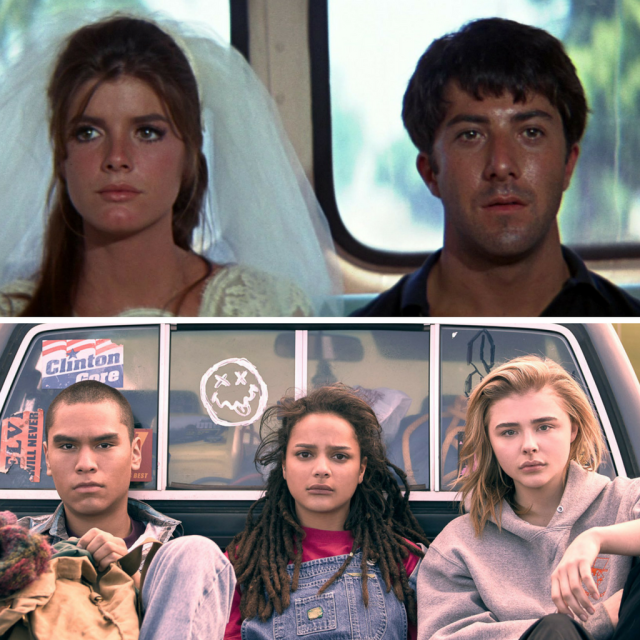
The comparisons between Cheerleader and Cameron aren’t useless, though. They open up the door to assessing how things have both changed and remained the same for queer youth and the filmmakers who try to do them justice. Twenty years ago, Megan was sent to conversion therapy for exhibiting cultural symptoms of lesbianism (owning a Melissa Etheridge poster, etc.) rather than actually sleeping with girls. In classic teen romance style, she’s kept virginal until deflowering suits the narrative arc — and even then, Megan and Graham keep their clothes on. Knowing what it was up against, Cheerleader wisely elected to laugh through the tears rather than harshly indict the “pray away the gay” adults who caused the waterworks in the first place. And yet: the director was still punished. Babbit went through hell to secure an R-rating for her film. And while the MPAA demanded that she cut Natasha Lyonne’s tame masturbation scene, they permitted Jason Biggs fucking apple pies in theaters across the Bible Belt.
In 2018, Cameron is able to say in deadpan what Cheerleader had to veil with smart humor in 1999. As we see in the prom sequence and her flashbacks to hooking up with Coley the first time, there’s no denying Cameron was a healthy, sexually active teen before arriving at God’s Promise. Akhavan’s found intricate ways of using sex to convey what many queer women experienced during adolescence, but never thought we’d see in a movie house: sensations and dynamics that extend past that overrepresented moment of initial epiphany and processing.
“I don’t think it’s overstating to say that my religion of choice became VHS rentals, and that its messages came in Technicolor and musical montages and fades and jump cuts and silver-screen legends and B-movie nobodies and villains to root for and good guys to hate.”
The Miseducation of Cameron Post, Part One: Summer 1989
When Cameron and Coley first have sex, it’s as the hotel scene from Donna Deitch’s lesbian classic Desert Hearts (1985) plays on the television across the room. Cameron introduced the film as a means to come out to Coley with images (instead of the labels that still feel too certain). In the book, the sex scene Cameron communicates with is from The Hunger, Tony Scott’s 1983 vampire movie starring Catherine Deneuve and Susan Sarandon. When the rights to the latter proved tricky to secure, Akhavan settled on Desert Hearts. Granting the groundbreaking independent film that Deitch once promoted with D.I.Y. flyers residency within her indie successor was the right choice. Call it Divine intervention. Desert Hearts has experienced a surprise revival over the last few months, achieving Criterion status and enjoying a run at Sundance in 2017. “It’s crazy because we’d already shot the film at that point. I remember being so shocked of the coincidence of that film just being in the lesbian canon for decades and suddenly being watched again,” she said. The scene brings together three eras of gay culture: 80s, 90s, and present day (the viewer) in a way I’d never experienced before. Often, queer culture is depicted as a groundbreaking, state-of-the-art thing rather than the continuation of a rich lineage. (Deitch hasn’t seen The Miseducation of Cameron Post yet, but she’s looking forward to it.)
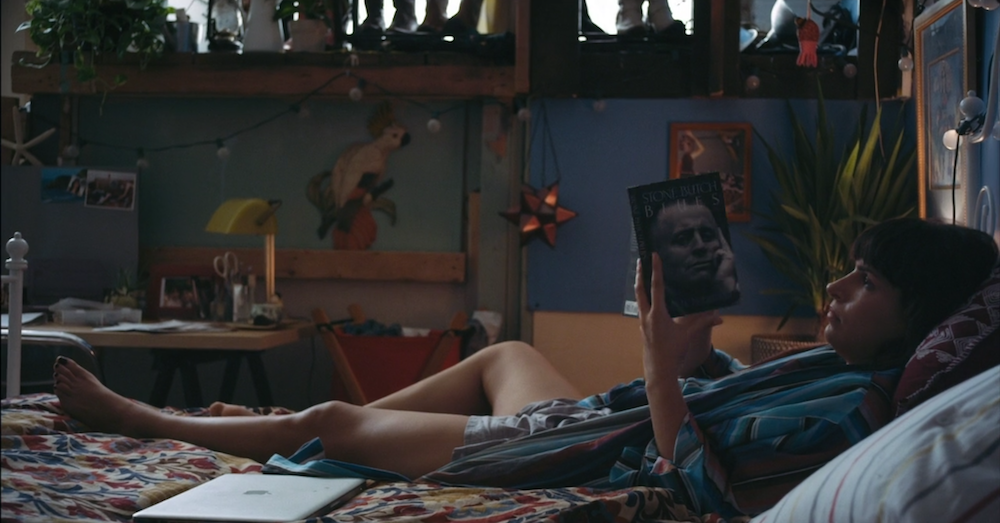
Appropriate Behavior
There’s a similar moment of rich intergenerational dialogue in Appropriate Behavior, Akhavan’s dry comedy about professional, sexual, and racial in-betweenness in a place renowned for its self-assuredness (if not its self-importance): Brooklyn. Persian-American Chirin lies in her strange new bed post-breakup, attempting to wade through the copy of Leslie Feinberg’s Stone Butch Blues her ex bought her when they were still together. She eventually gives up, discarding the esteemed lesbian novel for some OKCupid cruising. The moment says so much about Chirin, her unmoored life, and her callous relationship to highbrow queer culture. (The late Feinberg, who celebrated “the pleasure of the weightless state between here and there” in Stone Butch Blues, probably wouldn’t fault her for it.)
Roughly a month before The Miseducation of Cameron Post’s world premiere, Desiree tweeted an IndieWire piece ranking the best sex scenes of the 21st century. The list included a number of sound queer encounters, including Carol’s breathy I never looked like that and Mulholland Drive’s hallucinogenic doppelgänger bang.
Blue is the Warmest Color, Abdellatif Kechiche’s excessive adaptation of a an emotionally deficient graphic novel, somehow topped the list. And Desiree, like a number of queer spectators, disagreed and fired back accordingly.
“Dear IndieWire I love you, but saying the sex in Blue is the Warmest ‘respected the essence of lesbian sex — raw, inventive, and unmatched in its intimacy’ is bullshit,” she tweeted. “The sex in that film is bullshit… The only worse thing than the sex in that film was the abuse that director made his actors suffer in order to get such a bullshit piece of wank bank fodder. Let’s stop celebrating bullshit.”
Because women are often relegated to the defensive when it comes to lazy representation and the awful stuff that happens to us IRL, I asked Desiree to play offense for a moment: What makes a good sex scene? Which films are on her ‘best of’ list?
“I really love this film by Catherine Breillat called Fat Girl. There’s a really long sequence in it in which a girl loses her virginity. But you know she’s coerced and it’s while her younger sister’s in the bedroom. It’s an incredible sequence and it’s honest. I think sex scenes should be used to communicate something about those characters in that story. So often, it’s just used to communicate that sex is …happening.”
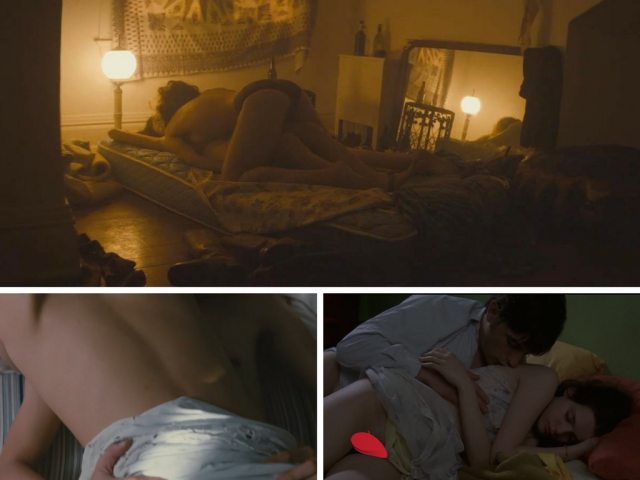
Clockwise, beginning at top: Marielle Heller’s Diary of a Teenage Girl (2015); Catherine Brella’s Fat Girl (2002); Ang Lee’s Lust, Caution (2007)
She went on to mention two other films, Lust, Caution and Diary of a Teenage Girl, that also feature love scenes resembling Cameron’s vacation bible school sand art. Each red-hot encounter is layered upon other tensions: occupational, familial, legal, or the all-too-relatable anxiety of being found out. Some of the scenes are haunting, featuring what some might consider amoral or even illegal behavior. But they are responsibly-helmed. Our lives can be ugly and contentious; it’s only fair that the female gaze expresses this from time-to-time.
When I caught Teenage Girl for the first time last summer, I wasn’t struck by the graphic nature of Alexander Skarsgård’s scenes with Bel Powley. I was struck by how the guy’s girlfriend/girl’s drug-addled mother, played by Kristen Wiig, seems to infiltrate every scene. When Powley’s character asks Skarsgård’s to take her photo after they have sex for the first time, the viewer anticipates her mother discovering it (this, we eventually learn, is quite the red herring).
Fat Girl, which was temporarily banned by the Ontario Film Review Board for its depictions of teen sexuality, does a similar trick. It’s impossible to escape a young girl’s all-seeing eye as her beautiful older sister mercilessly comes of age. Even when these scenes involve a man, women are tasked with the lead role, theme, and narrative.
The director is no stranger to Rose Troche/Guin Turner-style collaborations with her girlfriends-turned-exes. Frugiuele produced Appropriate Behavior and co-drafted the script for Cameron Post; her breakup with Jungermann was written into The Slope. It’s less of a queer cliché than it is a testament to Akhavan’s greatest strength: artistic collaboration with women who also believe in the power of shoestring indie film.
In the weeks since Sundance, I’ve spoken with a handful of people who had stakes in Cameron Post’s shoot in autumn 2016. Unprompted, each has made it a point to emphasize Akhavan’s commitment to creating to building a nurturing, productive, and safe on-set environment where everyone was on the same page.
Cinematographer Ashley Connor (Mitski’s “Your Best American Girl”, Madeline’s Madeline), who was tasked with bringing Cameron’s blues and browns to life with what emily danforth calls “camera magic,” first met Akhavan over karaoke in Maryland when they were both touring with films. “When she was gearing up to do Cameron Post, she called me,” Connor said. “We had a meeting and the conversation flowed easily. We connected on a lot of similar films that we love and the way that we talked about the movie. It was a really easy process.”
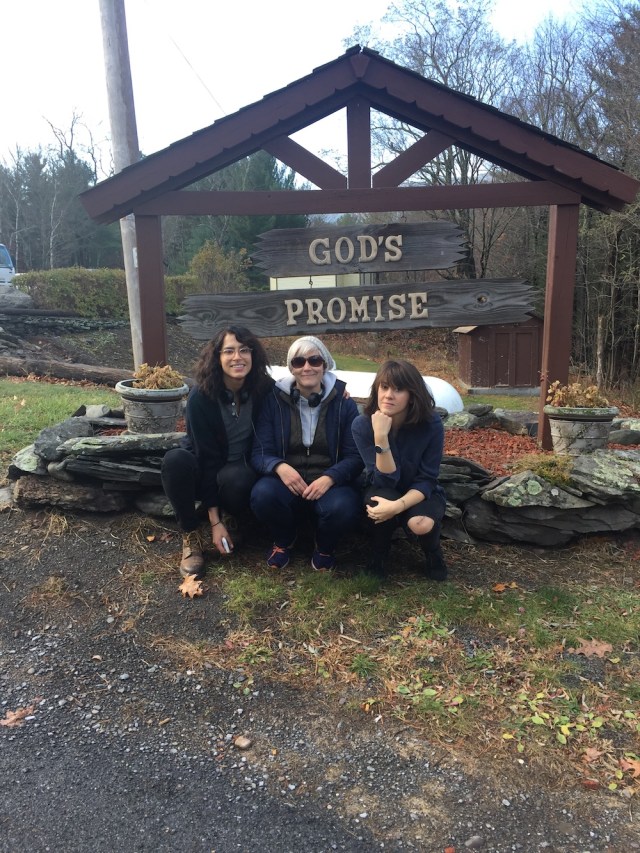
Desiree, em and cecilia on set
Pre-production location scout Jillian Stricker (The Big Sick, Little Men) heard about the film through a co-producer and immediately wanted in. “I had an intro call with Desiree and Cecelia and loved them both instantly. I not only liked the script, but felt inspired and driven to help make into a film.” Sticker’s biggest scouting success was Riedlbauer’s, the German-American resort in the Catskills that serves as God’s Promise in the film. “I had guidance from my girlfriend who lived in upstate NY for years and knew about this place and I found many more just like it,” said Striker. “But after searching for quite some time, seeing how many options there were, and unfortunately realizing that many owners were conservative and not willing to be a part of this story, it felt like a win to not only find a place that worked well creatively but that supported the film and values of the team.”
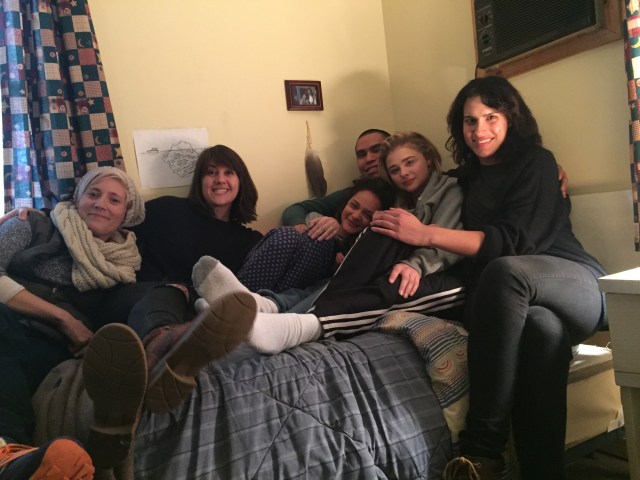
The cast and crew in bed at God’s Promise with Danforth
danforth also visited the set several times. “The cast and crew were really generous with me and, from my perspective, with each other,” she told me. “People were hanging out between their scenes and in the evenings, partly because so many of them were actually living at Riedlbauer for so many weeks together …I saw actors helping the crew with various jobs on days they didn’t have call times for hours at a time.”
When the U.S. Presidential election fell during the 21-day shoot, Akhavan turned what could’ve been the worst distraction — a reparative therapy proponent being named Vice President — into a catalyst for good cinema. “Film sets always become microcosms and alternative forms of community for this period of time that you’re all working together. But there was something about living, working, and going through the election that made it unique. Desiree really made the set a really loving environment.”
Two of the film’s actors felt personally impacted by the moment: Sasha Lane, who identifies as gay and also has a gay brother, and Chloë Moretz, who witnessed two of her brothers endure relentless bullying after they came out.
“The morning after Trump’s election, there was a bright and early call time, and many people were, of course, pretty distraught, so Desi addressed everyone on set that day about how, in the wake of this new administration, Mike Pence in the White House, this film, its story, would matter in ways they couldn’t have anticipated even the day before,” danforth told me. “And she asked everyone to take stock of that and hold onto it in their disappointment and anger and grief, all of the things so many of us were feeling that day.”
While Cameron Post isn’t filmed in the Montana of its source text, it doesn’t make the subject matter any less real. “Truly, these camps could have and unfortunately do exist in the Northeast, as well,” Jillian explained.
She’s right. New York didn’t ban the practice of conversion therapy until last year, with 24 assembly members opposing the ban. NYC followed suit this winter. If you poke around enough, you can find pictures of these now-abandoned (un)amusement parks for queers. Some conversion facilities are more subtle in appearance — like the Neighborhood Church of Greenwich Village, which looks less like God’s Promise and more like a bodega that’s eluded gentrification’s tell-tale sheen.
As for Montana: There’s no ban on the books yet. But there’s always a possibility that Cameron Post could change that.
The Miseducation of Cameron Post received the Sundance 2018 Grand Jury Prize for Drama, an award that has gone to a handful of queer interest films in previous years, including Pariah, Poison, Waiting for the Moon, and Welcome to the Dollhouse. The panel of industry professionals that went to the wall for Cameron Post included Rachel Morrison, Jada Pinkett Smith, and Octavia Spencer. Despite receiving the prestigious Award and glowing reviews from foremost critics, a company has yet to step up to distribute Cameron for theatrical release.
“Appropriate Behavior” Is Fresh, Authentic, Features a Bisexual Persian Character
One fine day, Robin, Hannah, Alley, and KaeLyn got together via our laptops, across multiple timezones, to dish about Appropriate Behavior, Desiree Akhavan‘s 2014 breakout feature film. You know, that movie everyone is talking about — including us. In lieu of a more official movie review, here are our uncensored (mildly edited for typos and brevity) thoughts on the movie everyone in the queer lady-loving community and indie film universe is buzzing about.
It’s off of the film fest circuit finally but may be screened at an indie theatre near you. It’s also available to stream on iTunes and Amazon instant video.
Robin: Here! Just ordered an iced tea and a giant slab of banana bread from this kinky cafe and I’m READY.
KaeLyn: What is a kinky cafe?
Robin: It’s a cafe that is also kink friendly!
KaeLyn: Like you can practice kink while you have a latte?
Robin: Yup.
KaeLyn: It is like a cat cafe but with kink?
Robin: Yuuuup.

Literally Robin’s life right now. (via shutterstock)
Alley: Wow, we don’t even have that in Portland…
KaeLyn: I feel like the kink cafe would be in Appropriate Behavior.
Robin: It TOTALLY WOULD
You have the option of taking your (or your sub’s) coffee in a dog bowl. It’s that kind of place that I think Appropriate Behavior would have featured.
KaeLyn: Are you drinking out of a doggie bowl?
I’m so distracted by your kink cafe.
I wish we were all at the kink cafe.
Alley: Sounds like the right place to discuss Appropriate Behavior.
KaeLyn: So let’s start with this: Describe your overall reaction to Appropriate Behavior in one sentence.
Hannah: “Charming.”
Alley: “I wanted it to be as brilliant as the preview.”
Hannah: Oh, one sentence.
Haha I thought you said one word.
KaeLyn: Haha I guess that can be a sentence, but you’re welcome to change your answer.
Hannah: So I gave like one of those theatrical preview pullout quotes, “CHARMING.”
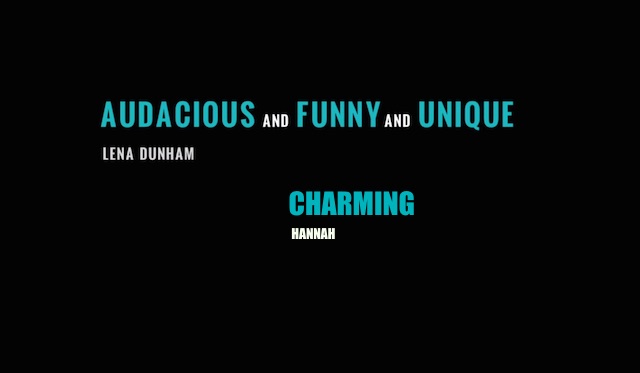
Robin: “It feels true to a queer scene that I would never be a part of, but in an endearing way.”
KaeLyn: “I felt like I was watching a slightly better and queer version of Girls.”
KaeLyn: OK, fantastic. LOL.
What were your favorite parts? What did you react to?
I was really pleased to see a narrative with a bisexual WOC character front and center. I feel like there are so few movies for queer audiences with bi leads. We’re always the sidekick character. Or the “will she or won’t she date the guy/woman” character.
Alley: Yeah I thought Shirin was a very likeable and nuanced character. Much more so than anyone on Girls.
Robin: Yeah I really liked how casually the film treated Shirin’s experiences.
KaeLyn: Yes, and Shirin was just like, “I’m bi. That’s it.” There was no need to discuss her sexuality deeply or for it to evolve or whatever the typical tropes for bi characters are. It was more about her as a three-dimensional person… with all her flaws.
Robin: Oh yeah, I really really liked how a lot of the development isn’t like, Shirin figuring her sexuality or identity out, it’s about her flaws in trying to communicate/connect with/unhook from people. Like that’s what I got from it.
KaeLyn: On what Alley said about her being a nuanced character, I actually found her kind of annoying. Sweet, but annoying. Which is very real. I feel like that about a lot of people IRL. I’m a little older than Shirin and the other characters, so I found some of her plight a little hard to relate to, but I enjoyed it anyway. If that makes sense.
Alley: Yeah she was occasionally annoying but in a way I can relate with so it made her a little less so. Although I am also older…
Other favorite parts were really specific quotes like:
“You’re ruining my birthday.”
“You’re ruining my 20’s.”
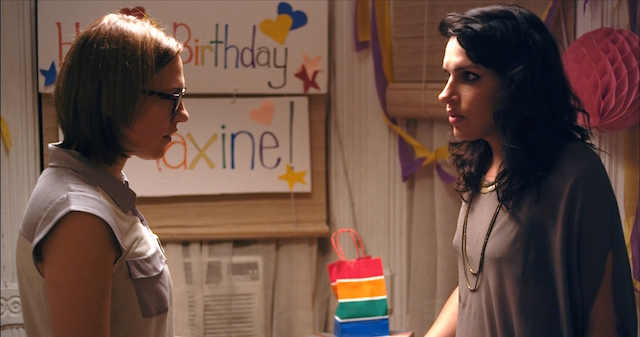
You’re ruining my underwear.
KaeLyn: Haha, Alley. Yes! The writing was so good throughout.
Alley: But this one was my real fav:
CRYSTAL: No, you know, there are people in this world who go on first dates that are perfectly great, and then they wait a while before they engage in sexual contact.
SHIRIN: That’s disgusting.
CRYSTAL: I know. I think it all happens outside of New York.
Robin: What was the line she said when she & Maxine were at her family thing?
“I’m your exotic experience!”
KaeLyn: I saw it in a theatre and I often felt like I was the only one laughing. Like the humor was so dry, but it was so good.
Hannah: Can we talk about the rubber outfit guy? What was that about?
Robin: He had empty eyes.
Alley: He was oddly sweet?
Robin: Ahahaha!
Hannah: Oh, he kind of gave me the creeps.
Robin: Oh, he was kind of sweet and I definitely felt for him. But also, empty eyes.
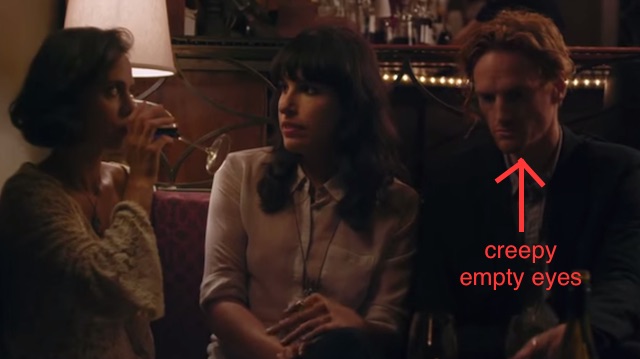
Alley: Ugh, I didn’t have a chance to rewatch and I watched it initially in January so I am having trouble remembering specifically.
Hannah: She was totally an asshole to him though.
Robin: Yeah!
Hannah: In a way I related to.
Alley: But the girlfriend was the mean one, is what I’m remembering.
Hannah: Well he did kick her out after her failed attempt to kiss him. It was sort of mutual assholery all around.
Alley: Worst threesome ever
Well not ever but…
Hannah: Yeah, I was gonna say. I’ve had worse.
Alley: Me too…
Unfortunately
KaeLyn: Hahahaha
I have only had good experiences, I guess
Alley: Like the opposite of Stef’s amazing musical story, which is officially my favorite threesome story ever.
KaeLyn: I loved that scene because they told so much through body language. There was very little talking.
Hannah: Yes!
KaeLyn: But you knew exactly what they were all thinking.
Robin: Yes!
Hannah: I love that.
KaeLyn: And that’s so true to sex IRL. Like, we should talk about what we want and what we’re doing. Oh god, we should do that, but so many people just fumble through it.
Hannah: It just says so much about the actors and the directors and the editors all working so well together.
Alley: Agreed. It was a very well done scene even if it was uncomfortable. I mean that was on purpose and clearly came through.
KaeLyn: It was SO uncomfortable.
Hannah: Ugh when she kisses him on the shoulder!
I wanted to become a puddle
KaeLyn: I thought a lot of Shirin’s narrative was about drifting, feeling surrounded by people, but always alone. And this was such a great example of that.
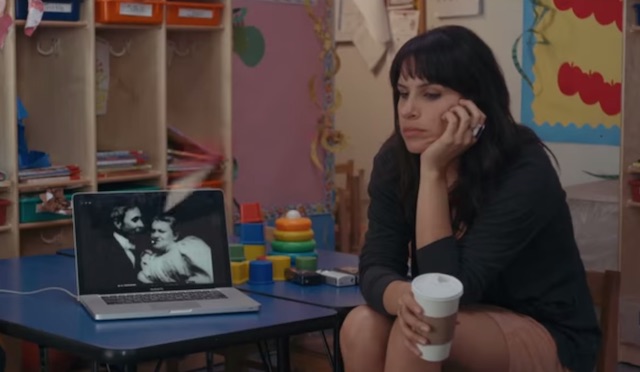
I think I have to poop.
Alley: That’s an interesting point and kind of reflects the timeline.
Hannah: I really like that.
KaeLyn: Like she is just so hungry for connection.
Alley: Which I wasn’t sure I liked because it seemed so opposite of what I expected from the trailer, but hearing your thoughts kind of makes me think it worked.
Hannah: I don’t think it directly relates to the bisexual narrative, but it does reflect a sense of outsiderness.
KaeLyn: And after losing Maxine, she doesn’t know how to plug in but she keeps grasping at it.
Robin: Mmmn, I agree. But also can we talk about Maxine?
KaeLyn: I think it does directly relate to the bisexual narrative.
Hannah: Or I guess that it could stand alone? But also strengthens the bisexual narrative? Sorry my head is full of mucous.
KaeLyn: There are usually those stereotypical narratives about bisexuals we chatted about earlier. So there is no “bisexual path” to follow. So how does a real life bisexual navigate the world? Shirin is mired in a world of “otherness.” She’s got her Persian family and her white ex-girlfriend and being stuck in her mid-20’s somewhere between that lawyer she goes on a date with and the idiots she also tries to date that are beneath her. That’s the whole movie, right? Like where can she fit in?
Hannah: Yeah, we’re agreeing, right KaeLyn?
KaeLyn: Yes, we’re totally agreeing. I’m just writing too much. LOL
Sorry, Robin! Yes, let’s talk about Maxine!
Robin: Y’all, I am gonna be real. Shirin & Maxine’s entire relationship didn’t resonate with me. I can’t tell if that’s the intent.
KaeLyn: I felt the same. Say more. What about it for you?
Robin: The thing that comes most strongly to mind is when they get high together and they say their “I love you’s.” But it felt… unearned? Like a shortcut to an emotional payoff.
KaeLyn: OMG Refresh my memory. I watched it in October and I’m blanking on this scene.
Robin: I think it was a flashback that starts with Shirin waiting at the window while Maxine picks up weed
Alley: Yeah, I think that was one of the scenes that started my “backwards” feeling of the narrative.
Robin: And then they smoke and Shirin’s like, “We’re the same kind of stoned person,” and that becomes a moment.
Hannah: Ahahaha
KaeLyn: YES. I remember now.
Alley: Agreed, it was kind of unearned.
Robin: And I couldn’t tell if it was meant to show how… specious their relationship was? Or I was just being an Old Person and thinking “You’re STONED, do you even KNOW WHAT LOVE IS?!”
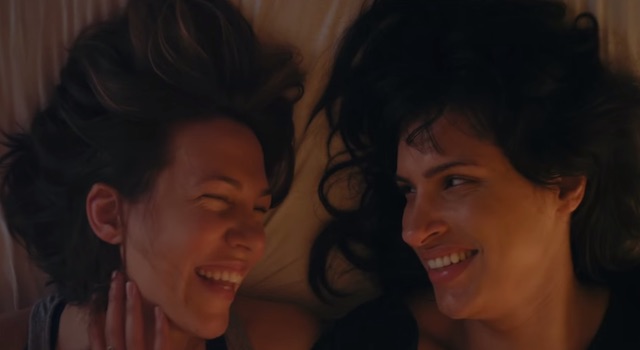
OMG I DON’T KNOW WHAT LOVE IS AND ALSO I REALLY WANT A PIZZA BAGEL.
Hannah: Okay, so maybe this is just because I don’t remember how the scene hit me in the moment, but I feel like it was deliberate. Sort of a commentary on the selective memory we have about our relationships? Like maybe she was even looking back on that moment and thinking, “I was stoned. I don’t even know what love is”?
KaeLyn: That’s an interesting way to think about it, Hannah.
Robin: I dunno, for something that ostensibly kickstarts the narrative of the movie, the relationship felt thin to me.
Alley: Yeah, I can’t say I ever really liked Maxine.
KaeLyn: Here’s a question: did you think the movie was about the relationship with Maxine? I didn’t.
Hannah: No, not at all. Though I did have empathy for Maxine at points.
Alley: Not sure what exactly it was trying to say beyond being funny that they first met/commiserated over hating everything — like hating things is such the cool hipster thing to do…that they hate.
KaeLyn: Yeah, Maxine was just as immature as Shirin. She was more patronizing, though. I felt like Maxine felt Shirin was beneath her intellectually and socially.
Robin: Agree.
Alley: KaeLyn, no, you’re right. It wasn’t just about that relationship for sure. It was about Shirin finding her way in the world. Which she sort of does by the end and sort of doesn’t, which is pretty true to real life. So I appreciated that.
KaeLyn: Yes, I think the audience I was watching it with was expecting a hipster romantic comedy.
Alley: Yeah, it was better than that for sure. Not that a hipster romantic comedy wouldn’t be fun to watch, but it went deeper.
KaeLyn: Can we talk about what we didn’t like or what didn’t work?
Hannah: I don’t think I took many issues with it. Other than the aforementioned thin relationship, it wasn’t trying to be anything more than what it was.
A little slice of life, of a person just trying to live the life they are meant to live. There was no moral, or high drama. It was just pretty and it felt honest to me.
Robin: I do wish there had been more with her family, but like, that gets into the territory of “I’d have done it differently.”
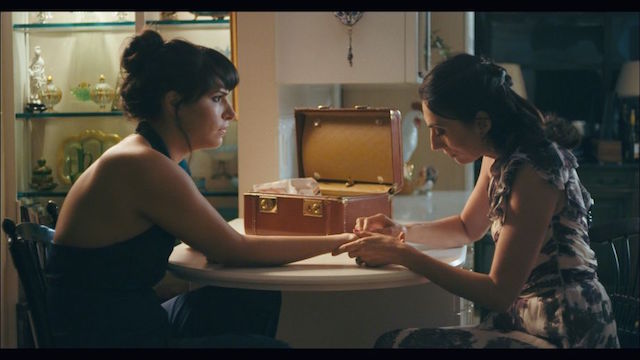
Ugh. Mom, you’re supposed to soak the cuticles first. This is why I never let you do my nails.
KaeLyn: I feel like it took a queer filmmaker, writer, actor to pull off that level of authenticity. It felt fresh to me. But I have to say I don’t love it as much as other people seem to. I enjoyed it very much. Does that make sense?
Hannah: Yeah.
Robin: I think I’m with you, KaeLyn.
KaeLyn: Like some people are over the moon about it and I’m like, “That was a really well written, directed, and acted movie with high production value and it felt really authentic and the narrative thread was strong. And it wasn’t my favorite.” And I can’t put my finger on why I’m not more ecstatic about it.
Alley: Me too KaeLyn.
KaeLyn: I can’t even say what I wish was different.
Alley: Like, I can’t pinpoint what could have been better but, like, the trailer was SOOOO good I was a tad disappointed.
KaeLyn: I guess that the one way it is cliche is it’s another story about a queer person with lots of class privilege interacting almost exclusively with other people with high levels of social and economic status. And maybe that made me feel less snuggly about it.
Alley: The class aspect is a good point.
KaeLyn: It’s what I don’t like about Girls. SO “white feminist” framework.
Alley: I was about to say that but didn’t want to keep bringing that up :wink:
KaeLyn: Haha.
Alley: That show just reminds me of all the women I went to college with that I loathed.
KaeLyn: Yeah, I think that’s what kept me at an emotional distance from Appropriate Behavior. Everyone was so privileged and really only had that worldview. And I kind of wanted them all to get over themselves.
Alley: It’s that balance of the film making fun of their own privilege but also getting a little mired in it. Tough balance.
KaeLyn: But lawd, there are hundreds of similar movies and books and musicals about “finding yourself” that feature young white men.
Alley: Totally.
KaeLyn: And even if there are problems with that “journey to the self” trope, I’m just so grateful there was a bisexual Persian woman at the center of it this time.
Alley: “Appropriate Behavior: Way less annoying than Igby Goes Down.”
KaeLyn: HAHAHAHA
Robin: HAAAAA
Hannah: Hehehe
KaeLyn: OK, so wrap up question: Would you recommend it?
And why?
Hannah: Yeah sure.
Robin: I would!
Alley: Absolutely, even if there are some formulaic portions even taking a “quintessential” or supposedly “universal” story and giving it to a bisexual woman of color is worth it and there are some damn funny lines.
KaeLyn: On a scale of 1 (the worst) to 10 (the best), I’m giving it a 10 as a film and a 7.75 on a personal level.
Robin: Yeah, like I wouldn’t be mad if my queer ladies film club wanted to watch it again.
Alley: I fully expect, also, that Desiree Akhavan’s next film will be even better.
KaeLyn: I would watch again.
Alley: I loved The Slope.
KaeLyn: I can’t wait to see what she comes out with next. Appropriate Behavior is definitely putting her on the map.
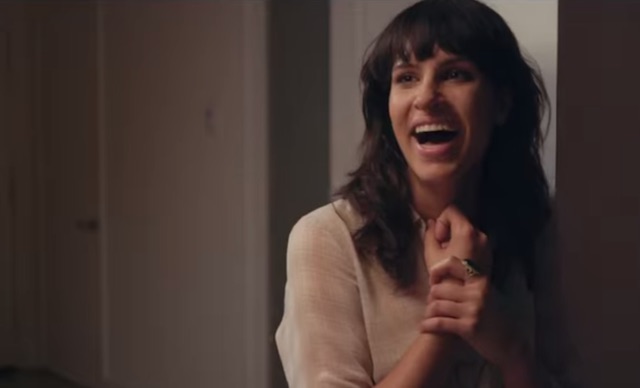
I am literally winning at everything.
Hannah: Also you guys know that Desiree Akhavan was actually on Girls for real, right?
I meant to say that earlier, when you were complaining about Girls.
KaeLyn: Yeah recently right? But I haven’t seen those episodes. I mean, I’ve only seen a few.
Hannah: Yeah it’s brief. She plays pretty much the same person.
KaeLyn: She plays a writer?
Hannah: Yes, she does.
KaeLyn: I have no idea because I don’t watch Girls. Except that one time when I gave it the ol’ three-episode try and it failed.
Hannah: Yeah, I only saw the first couple episodes this season. I could go on about why Marnie is the entire reason the show is terrible but I’d be talking to a wall.
KaeLyn: Haha. Any final thoughts on Appropriate Behavior?
Alley: I would probably give it a similar rating, KaeLyn, but to keep it simple I’ll just give it an 8.
KaeLyn: Hahaha
Robin: I would give it a 7. No, amend: 8.
Robin: Just remember the “I’m your exotic experience” line which is the REALEST MOST AWKWARD THING. I cannot find the exact wording but it really stuck with me.
KaeLyn: That was the best! Ok, I’m bumping it up to an 8.
Alley: Hahaha, I like how we are all groupthink convincing each other to up the rating by 1.
KaeLyn: When I mini-reviewed it on Autostraddle in my film fest recap in October, I gave it this: “Rating: Ten sammies from that new Vegan Pork-Dumpling Grilled Cheese food truck with the hot server.” I stand by that. No, I amend it to include the kinky coffee shop that Robin is at.
Robin: Oh, KaeLyn, here’s the link: Wicked Grounds Kink Cafe & Boutique
Alley: I was just in SF working from coffeeshops. Wish I would have gone there!
KaeLyn: It is so cute and unassuming from the outside. Well, if you don’t know what the leather flag looks like… Ooh, they have pizza bagels!!!
Robin: It’s really like your average coffeeshop until you start looking at the art on the walls.
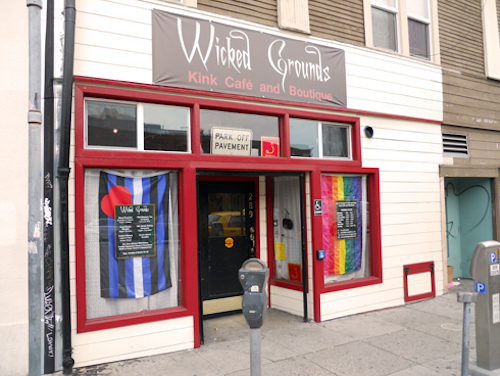
They have pizza bagels!
KaeLyn: Oh, so no one is doing kinky things around you IRL? I really feel like would be the best.
Robin: Eh, not yet. And the lil knickknacks for sale. It’s only 3 PM here.
KaeLyn: OK, fine. That’s acceptable. I’m assuming you can only play, right? You can’t actually fuck? That seems unsanitary.
Robin: I mean the bathroom is spacious and there’s only one key…
Alley: Hahahaha
KaeLyn: Ooooh
Robin: Attached to a heavy chain.
KaeLyn: Well that’s fine. I just don’t want lube too close to my coffee.
Alley: Would that be like a Bulletproof Coffee spinoff?
Robin: Yesssss
KaeLyn: Alley!!!
Robin: Oh my god. What would the spinoff be called?
KaeLyn: Frictionproof Coffee? Bullet Coffee and it is served with a bullet vibrator?
I dunno. We need Lizz or Ali on this…
What do ya’ll think? Will you be seeing it? Have you already seen it? How would you rate it and what are your smart and insightful thoughts?
Get to your nearest kink cafe and tell us everything.